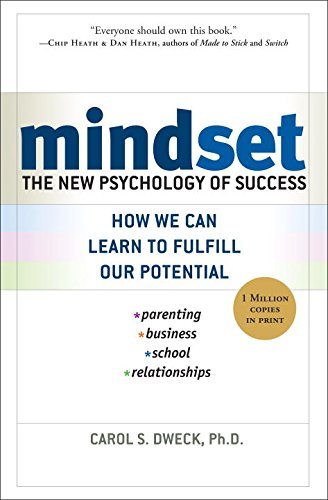What do you think?
Rate this book


276 pages, Hardcover
First published January 1, 2006
What’s wrong with them? I wondered. I always thought you coped with failure or you didn’t cope with failure. I never thought anyone loved failure. Were these alien children or were they on to something?These children turned out to be thinking with a growth-mindset. A person with a growth mindset believes that human qualities, such as intellectual skills, can be cultivated through effort. Having this belief, not only they do not get discouraged by failure, they don’t even think they are failing. Rather, they think that they are learning, and consequently, they get smarter!
Look, what a smart boy/girl …Sorry to tell, but you are doomed if you have heard similar praises during your childhood. Such complements may come from your parents, teachers, caretakers, the source doesn’t really matter. But wait for a second, aren't such praises suppose to uplift your spirit and raise your confidence?
You are so intelligent, excellent …
Hmm, good job, this might have been an easy puzzle, let’s do something more challenging…
or
Hmm, good job, you seem to have worked so hard, let’s move on to a harder puzzle.
When it’s really hard, and I try really hard, and I can do something I couldn’t do before.
When I work on something for a long time and I start to figure it out.
See the difference? Which set of answers resonates most with you?
There was a saying in 1960 which read: “Becoming is better than being”. The fixed-mindset robs people from the luxury of becoming. They have to already be.
Mindset in relationships
Mindsets manifest themselves in every domain, whether you are a leader, teacher, parent, or a husband/wife. I chose relationship since I guess there are lots of myths around this topic (we all once craved to find our one true soulmate I guess), and also you must beware that even people with growth-mindset, might approach a domain like relationships with fixed-mindset.
People with fixed-mindset think that if their relationship is the right one, and if they are compatible with one another, well, this means most things will fall into its place. In the face of problems, they tremble and threads of doubts and fears start to sneak in.
People with fixed-mindset say if this is the right relationship and if we are compatible, there must be no need for hustle and hard work to get it to work. Remember the delusions sparked by the fixed-mindset? “If you have the ability, then you shouldn’t work hard for it”.
Aaron Beck, noted marriage authority, says that one of the most destructive beliefs for a relationship is “If we need to work at it, there’s something seriously wrong with our relationship.” Says John Gottman, a foremost relationship researcher:
Every marriage demands an effort to keep it on the right track; there is a constant tension . . . between the forces that hold you together and those that can tear you apart.
As with personal achievement, this belief—that success should not need effort—robs people of the very thing they need to make their relationship thrive. It’s probably why so many relationships go stale—because people believe that being in love means never having to do anything taxing.
How do I go from fixed-mindset to growth-mindset
In this section, I share with you how you can adopt a growth mindset. Congrats, we have already taken the first step by shedding the light on these two modes of thinking. Regardless of these further steps, the sheer awareness of these two mindsets takes you a long way, but, it may not be enough.
One way which is a profoundly effective way to instill the growth-mindset is studying the lives of great performers, and world-known figures like Michael Jordan, Mozart, Michelangelo, etc. Why, you might ask. The reason is that when you study the lives of such achievers, you will notice a common theme in their life story and that it, “hard work”, and not talent or IQ. While people marveled at the Pietà masterpiece, this is how the wizard, Michelangelo responded:
If people knew how hard I worked to get my mastery, it wouldn't seem so wonderful at all...
For practical insights refer to: Growth Mindset vs Fixed Mindset



